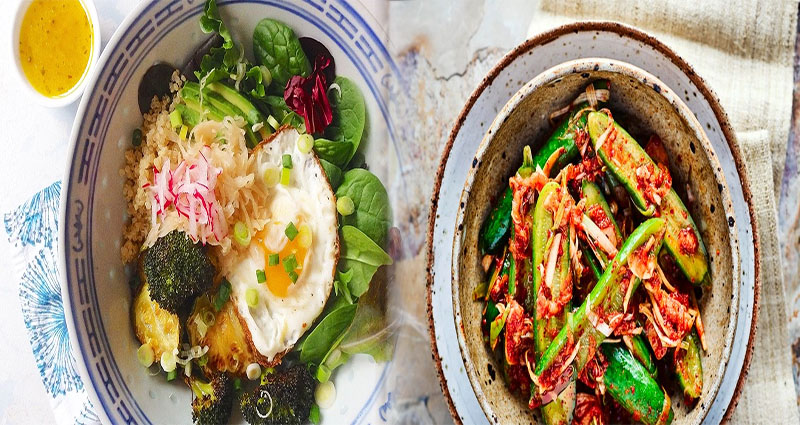Maintaining a healthy digestive system is vital for overall well-being. One key aspect of digestive health is the balance of gut flora, the trillions of microorganisms in our intestines that play a crucial role in digestion and immunity. Incorporating gut-friendly foods into our diet can promote a healthier digestive system and support the balance of gut flora. In this article, we will explore the benefits of gut-friendly foods and provide a list of foods rich in probiotics, prebiotics, and fiber.
Understanding Gut-Friendly Foods
Gut-friendly foods are those that nourish the digestive system and support the growth of beneficial gut bacteria. They can be categorized into three main groups: probiotics, prebiotics, and fiber.
Probiotics are living bacteria and yeasts that offer numerous health benefits when consumed. They help restore the balance of gut flora, improve digestion, boost immunity, and reduce inflammation. Foods like yogurt, kefir, sauerkraut, tempeh, and kimchi are excellent sources of probiotics.
Prebiotics, on the other hand, are fibers that serve as a food source for the beneficial bacteria in our gut. They help these bacteria thrive and maintain a healthy gut environment. Foods containing prebiotics include whole grains, bananas, onions, garlic, artichokes, and asparagus.
Fiber is a non-digestible carbohydrate that supports the movement of food through the digestive system, prevents constipation, and provides fuel for beneficial gut bacteria. Fruits, vegetables, legumes, whole grains, and nuts are rich sources of fiber.
Probiotic-Rich Foods for Gut Health
Probiotics are known for their positive effects on gut health. Incorporating them into our diet can enhance digestion and improve gut flora balance. Some of the best probiotic-rich foods to consider include:
- Yogurt: Choose plain, unsweetened yogurt containing live and active cultures. Avoid yogurts with excessive added sugars.
- Kefir: A fermented milk drink packed with probiotics. It is a great alternative for individuals who are lactose intolerant.
- Sauerkraut: Fermented cabbage that contains a diverse range of healthy bacteria. Look for unpasteurized sauerkraut to maximize probiotic benefits.
- Miso: A traditional Japanese paste made from fermented soybeans. It is a rich source of probiotics and adds a savory flavor to dishes.
Prebiotic Foods for Nurturing Gut Flora
Prebiotic foods act as nourishment for beneficial gut bacteria, helping them thrive and maintain a healthy gut environment. Consider incorporating these prebiotic-rich foods into your diet:
- Whole Grains: Include whole grains like oats, barley, quinoa, and brown rice in your meals.
- Bananas: Rich in fibers such as inulin, bananas support the growth of beneficial gut bacteria.
- Onions and Garlic: These flavorful ingredients are not only delicious but also excellent sources of prebiotics.
- Artichokes: High in a type of fiber called inulin, artichokes provide nourishment for beneficial gut bacteria.
Fiber-Rich Foods for Optimal Digestion
Fiber plays a crucial role in maintaining a healthy digestive system. It adds bulk to the stool, promotes regular bowel movements, and supports the growth of good gut bacteria. Incorporate the following high-fiber foods into your diet:
- Fruits: Berries, apples, pears, and avocados are all fiber-rich fruits that can support digestive health.
- Vegetables: Broccoli, carrots, Brussels sprouts, and leafy greens are excellent sources of fiber.
- Legumes: Beans, lentils, chickpeas, and other legumes are not only high in fiber but also offer a good amount of protein.
- Nuts and Seeds: Almonds, walnuts, chia seeds, and flaxseeds are all nutritious options packed with fiber.
Combining Gut-Friendly Foods in a Balanced Diet
Incorporating gut-friendly foods into a balanced diet is the key to reaping their full benefits. Aim to consume a variety of these foods daily for optimal digestive health. Here are some meal ideas that incorporate gut-friendly ingredients:
- Breakfast: Start your day with plain yogurt topped with fresh fruits, chia seeds, and a sprinkle of nuts.
- Lunch: Enjoy a salad with leafy greens, cherry tomatoes, broccoli, grilled chicken, and a dressing made with olive oil and apple cider vinegar.
- Dinner: Prepare a stir-fry with tofu, bell peppers, onions, and asparagus, served with brown rice.
Lifestyle Factors for Optimal Gut Health
In addition to incorporating gut-friendly foods, certain lifestyle factors can further promote digestive health:
- Hydration: Drink an adequate amount of water daily to support digestion and keep stools soft.
- Exercise: Engage in regular physical activity to stimulate intestinal movement and maintain a healthy digestive system.
- Manage Stress: High-stress levels can negatively impact gut health. Try stress management techniques, such as meditation, deep breathing exercises, or yoga.
Precautions and Considerations
While gut-friendly foods offer many benefits, it’s important to note that individual responses may vary. Some people may have specific food sensitivities or allergies which can affect their digestion. It’s always recommended to consult with a healthcare professional or a registered dietitian before making significant dietary changes.
Prioritizing gut-friendly foods is a proactive way to promote digestive health and support the balance of gut flora. By incorporating probiotic-rich foods, prebiotics, and fiber into our diet, we can optimize digestion, strengthen our immune system, and improve our overall well-being. Remember to combine these foods with a balanced diet, stay hydrated, exercise regularly, and manage stress for optimal gut health. Start small, make gradual changes, and enjoy the benefits of a healthier digestive system.











